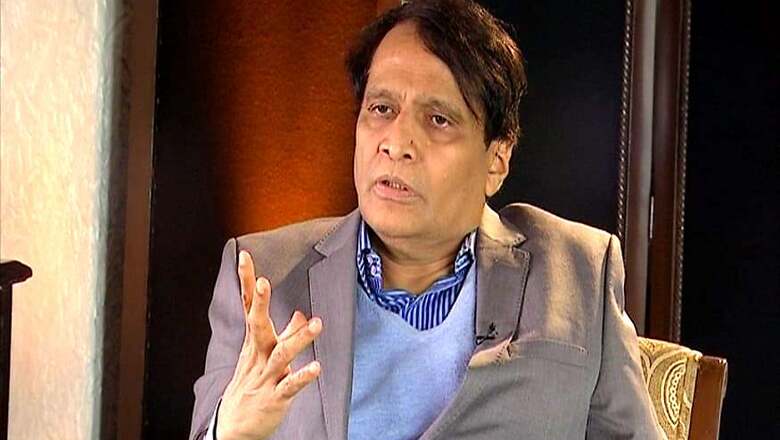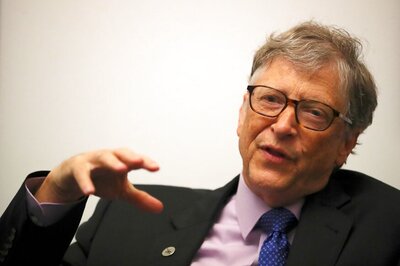
views
Narendra Modi will be the first Prime Minister to head to Davos in 20 years. He will be leading, perhaps, the biggest contingent this year in Davos. There are six ministers who are accompanying him and commerce minister Suresh Prabhu is the one who is responsible for ensuring that the focus country is India. In an interview with CNN-News18’s Marya Shakil, Prabhu talks about the Davos pitch, India’s firm stand at the WTO talks and the state of the Indian economy in general.
Edited excerpts:
Marya: Mr Prabhu, thank you so much for your time here. What will be India's pitch at Davos?
Suresh Prabhu: Over a period of time, Davos has become a very good meeting ground not only for the top political leaders of the world but also all the leaders from different spheres of life such as business, social issues, technology, bankers, all of them converge there. So you know, as it always happens, sometimes a place gets prominence then everybody keeps going there. So, this time Prime Minister Modi is going there after more than 20 years, at a time when the Indian economy is on an upswing. When everybody is looking at India. Honestly, I am telling you, if you go to any country in the world, they will all tell you that their priority is India.
Marya: But that is the question. There is a recent slowdown that we are seeing in the India economy. How tough do you think it will be for you to project India as a global investment hotspot.
Prabhu: Where is the slowdown? Let me give you some numbers, then you tell me whether it is a slowdown or otherwise. Exports are rising, industrial production is going up, business confidence is going up. Purchasing Managers Index, both for services and manufacturing, is going up. We look at the numbers the World Bank is giving. It is looking up, so where is the slowdown.
What is important is when you do some structural changes, such as the GST, businesses take time readjusting themselves to it. When I talk to most of the businesses they tell me that GST is good for them. They are actually bullish on that. And they are actually helping the businesses grow. For example, there was a businessman who was doing a business of, say, refrigerator. You are assembling a refrigerator, next is paying all the taxes and, everything. Next door to him, say somebody, who is completely unorganised, not paying any taxes and has no records. How do you make sure that businesses will grow? So for the first time, we are formalising an economy and making sure that there is a transparent system. You don't have to go to the sales tax office anymore because GST will subsume so many taxes. And you can do it online as well.
Marya: If I were to talk about Davos a little more, with the PM leading this contingent, how bullish are you about big investments to come through this time around?
Prabhu: In a big way, which is why, as I was telling you, the whole world is interested in India. They are all looking up to it. Look at FDI numbers. These are clearly showing where the world is heading for. People want to put money into India. We are removing lot of sectoral caps. We are making sure that the procedural formality that one has to undergo is reduced. Ease of doing business has gone up. This is what the foreign investors look at.
For the first time, we are working on ease of trading that has never been done before. So my ministry has started working on ease of trading wherein we will be creating one common platform to ensure that even trading related issues are addressed. For the first time, as the global market is growing, Indian market is also growing. So with Prime Minister Modi going there and speaking to all of them about the great reforms that have been done in India, I am sure investments would follow.
Marya: You have talked about unveiling a new industrial policy. There's a lot of expectations and enthusiasm about it. Global investors are looking at what exactly will this be. When can we expect it and what will be the key focus areas.
Prabhu: See, this is only the third industrial policy post-Independence. The first one came in 1956, then 1992 and now this will be the third one. The first industrial policy talked about commanding heights for public sectors and others. The 1992 one removed certain bottlenecks. I think now when we are at the threshold of the digital economy, we should think about how to do business with least hurdles by the government and remove all the roadblocks that are there in the way. So that they should succeed. I have already set up a committee under the chairmanship of the DIPP (Department of Industrial Policy and Promotion) secretary to look into all the regulatory issues so that we remove all the hurdles and people are able to do businesses on their own. They have to follow labour laws. They will follow all the related welfare measures.
Our next focus is on new industries. See there are industries that aren't even born today. The sectors which are not even born today are the sectors which are going to grow faster. So you must focus on those sectors. So, we are focusing on that. It's a very clear element.
Marya: When you say new industries what are the sectors you are looking at?
Prabhu: Broadly, energy, artificial intelligence, genomics, life sciences. These are the kind of sectors which will really grow exponentially. If you take only information technology, all of that will fall into information technology. Even mobile phone is part of information technology — CIT (communication and information technology). We are trying to identify that critical sector which will grow. Blockchain technology will grow in future, so we have to think about the sectors which will grow faster and work on it.
Most importantly, I will tell you something. It's very interesting; you will appreciate it. We calculate that India is growing at 8%, 9% which are actually aggregate numbers which come from the aggregation of state growth numbers. How much is the state GDP growing, you aggregate all that: from Andhra Pradesh to West Bengal. You aggregate all the growth numbers. That becomes India's growth story. Now, if you really do it, it's only the capital of states which make the growth possible. This goes down to the districts. So, if you take each and every district of India, and every district grows only by 2%-3%, what is that growth? In each district, there are services, there is agriculture. In most of the districts, there is a manufacturing. So, if manufacturing, services, agriculture grow by 2-3% per district and the district administration plays a key role in promoting that, what will be India's growth story?
Marya: We are talking about India's growth story, but does the absence of jobs worry you?
Prabhu: This is another misconception. The jobs being created in India are phenomenal. When I was the railway minister, I commissioned a study to actually find out how many jobs we have created. We have phenomenally created jobs, so I think...
Marya: Phenomenally created jobs in the last three years?
Prabhu: Yeah.
Marya: Where are the jobs, Sir?
Prabhu: You know there is a direct correlation between investments and job creation. There's a correlation between economic activity and job creation. If you see railway investments in the last three years it was almost Rs 3 lakh 75 thousand crore as opposed to Rs 4 lakh crore that was invested in railways cumulatively in the past 70 years. Will the increased investments not create jobs?
Marya: Which are the sunrise sectors where jobs will be created?
Prabhu: That is exactly what I meant when you talked about sunrise. I am not even talking about sunrise because sunrise means that you see the sun rising. I am talking about something which has never even been seen. I'm talking about industries which aren't even born today. These are the industries which will drive the growth tomorrow. And that is where India should be investing along with modernising the existing industries. What is important is that we should not give up what we have got, we have a big base, we have an industrial base. We are still one of the largest industrialised countries in the world. So, we must use that base, modernise it. At the same time, look into the sectors which are not even born today.
Marya: So it is new jobs, now ideas, new skills.
Prabhu: Exactly. This is what we have identified. I think I want you to interview me again, so I will share with you when we come out with this new development. We are working with industry players to find out which are those sectors...
Marya: Questions are being raised again and again about jobs. You are making all the right noises, you are talking about ‘Skill India’ you are talking about ‘Make in India’, but when it comes to implementation on the ground, where do you think you are missing the mark?
Prabhu: That is exactly what I am saying. Service sector is creating huge jobs now but we don't have the methodology to capture that new economic activity. That is something that we must develop. The only service sector jobs that we can calculate properly are in the information technology.
Marya: But it is moving towards automation and artificial intelligence.
Prabhu: There is displacement of jobs due to technological development but there will be creation of jobs which will outrun the number of jobs lost. So this is why there will not only be losers but gainers also. That is why I told you we are identifying six such sectors which will have the propensity to generate more jobs.
Marya: Which are these sectors?
Prabhu: We are identifying and working on it.
Marya: You won't reveal it?
Prabhu: Sorry.
Marya: You won't reveal the sectors?
Prabhu: This is a work in progress. It is not like that I push a button and create six sectors.
Marya: Apple has been bargaining for a plant in India. Do you think that is happening anytime soon?
Prabhu: We have still not got any concrete proposal from the Apple team. When they met me recently I also told them that we have a ‘Make in India’ policy. With close to 1 billion mobile users in India there is a huge market available in the country. They are growing, and not me but a person like you can afford more than one mobile. So why don't we create manufacturing, this is something which is a welcome idea. But they must give concrete proposal; we are open for that. But we will wait for that.
Marya: Off late you have taken a strong stance at the WTO. You know it looks like the WTO meetings do not come to any conclusion are we looking at some kind of post-WTO world scenario?
Prabhu: There is a life after death. There is a life after dinosaurs, and we are working on making sure that WTO remains relevant we are a strong proponent of WTO because it is transparent, democratic, rule based and because it has succeeded in making world trade grow. This gives a platform to even the least developed country and the most developed country to have the same voice. So this becomes a very important platform to work on.
Marya: You have taken a very strong stance
Prabhu: I am saying these are the principles which are dear to us, therefore, if somebody is deviating from this stand we have to take a strong stand. It is not me alone, there 130-140 countries in the world which believe in this. If we deviate from that then obviously we have to oppose it for what we can call it. But we have not just given up on WTO, we will have a mini-ministerial in India in which we will actually invite top countries of the world to come and discuss ways to move forward.
Marya: There is a logjam on public food stock holding issue? Is a headway looking possible in that direction?
Prabhu: Let me tell you what the issue is, then you tell me if where we are right or wrong. In India, we want to ensure that all people are eating nutritious food. So it is a nutritional security issue and a food security issue. How do you make that happen? We are buying food from the farmers primarily to ensure that farmers get a fair price so we have a minimum support price at which government guarantees to buy from the farmer. So there is a reference price that the farmer knows that he will at least get. So he produces it. We buy from the farmers, put it in the public distribution system and feed those who need that food. Is anything wrong with this system?
This is the public stock-holding system we are talking about. Buy from the farmers at minimum support price (MSP) put it in the public distribution system so that the poor people, who cannot afford to buy at the market price, can have their nutritional and food security guaranteed. What is wrong with that programme? And it is a domestic programme. We are not distorting the global trade which is the mandate of the WTO. So, therefore, we are saying this should be protected. This was agreed first in Bali.
Marya: So what will India do?
Prabhu: We will continue with the programme. The programme is allowed to be done. There is a permanent peace clause available so we will continue with the programme.
Marya: Sir, China has been aggressively ring fencing the neighbour, is there a possibility that there will be some kind of free trade zones in South East Asia, South Asia?
Prabhu: You know South Asia. China is not a member of the SAARC, but we have promoted this idea for sometime. India has been talking about a common market for South Asia which has not yet happened. China is one of the largest trading partners of India but with a huge trade deficit. It is a worrying issue. I raised that issue with China. For the first time, China has agreed to look into trade deficit, to reduce it. Measures need to be taken for that by allowing more market access to the Chinese area.
Marya: From the point of view of jobs, do you think that skewed ratio that you are talking about, the lop-sided idea that you have between the India-China the trade, it may not be the right idea.
Prabhu: No, no. That is what I am saying. Anyway our primary focus is creating jobs in India, there is no question about it. Whatever we are doing is for the poor people of India. So even our global trade policy, our foreign policy, our economic policy are all aligned to this primary interest. We want to make sure that India progresses but this progress should also benefit the society. So whether it's a trade policy with China or with ASEAN or with any other country, we welcome it.
I'll give you an example. The other day, the black pepper which was getting imported through one channel into India, and affecting the farmers' interest was pointed out to us. We took remedial steps and within three hours the issue was resolved. We put minimum import price on the imported black pepper and as a result farmers gained immensely. We are primarily concerned with suing all the tools available to us in international trade to protect domestic interests of farmers, workers and the vulnerable sections of the society.
Marya: MSMEs are struggling with GST. Is the government worried about it?
Prabhu: First, if they are struggling we are definitely worried about it. But they are not struggling for the simple reason that we have taken number of steps in the last few months to ensure that that they it does not happen. In October, we took number of steps to address the concerns of the MSMEs and we are telling you that MSMEs will actually benefit from this. There were issues of communication and we are addressing all that. I must tell you very frankly that every day I meet at least 20-40 delegations of small businesses. Whatever concerns they have we take them down. We work with the finance ministry. We work with other ministries to ensure that their concerns are addressed.
For us MSMEs are very important. They are a very important part of the supply chain and the industrial policy you asked about. I will tell you we are trying to find out how we can link them to the global supply chain.
Marya: About about GST? The exporter refund of the GST is still stuck.
Prabhu: The finance ministry is already working on the refund issue. But over a period of time we will make sure that we come out with e-wallet system. Where first you won't have to pay so, therefore, the refund issue will not remain relevant at all.
Marya: Talking about certain numbers, trade deficit is at 37 months high. Gold imports are surging. Do these parameters worry you?
Prabhu: These are definitely worrying issues but let us go into the reasons for it. Obviously in India we import particular quantity of oil. We need to take medium term view. The Prime Minister has gone in for changing the energy profile of India by bringing more renewable extra so over a period of time we don't have to import that much oil.
We will take care of this over a period of time but in the short term it is an issue. We have already come out with the gold bonds to discourage people from using it. But it is a cultural issue. People want to use gold; I am sure you will also like to use gold. People want to use gold in India.
Marya: But the garment sector is a labour intensive sector and you are losing share in that. Isn't that worrying?
This is an important issue. We have provided more cash support to the textile industry. We have come out with come out with a package for leather industry as well. We have got Rs 8,400 crore for the exporters only last month.
Marya: Agriculture continues to be the focus of your government. Prime Minister has been talking about it again and again. From your ministry's point of view what should be the thrust in the Budget
Prabhu: You talked about post-WTO scenario. So, I will talk about not only Budget but the overall strategy for agriculture. One is agriculture export. See, Indian farmers’ income can increase dramatically when they have access to global market. When the agriculture production goes up. There is a relatively small issue that products don't last long, say, the life of fruits, vegetables. You know you have to send them immediately as they are perishable. So export is the best solution to that.
We are planning to bring in new technology to tackle this whether it’s tea, coffee, rubber or psices. Because these are very important components of not only India's export basket but also one of the important components of India's food and agricultural policy. So we are working on all these together and we will make sure agriculture remains the focus area, not in terms of domestic policy support but also linking it to global market
Marya: What will be the thrust of the budget as this will be the first full budget before the 2019 polls. From your vantage point how do you look at it?
Prabhu: I know about the budget as much as you know. Knowing our Prime Minister's thrust, I can tell you one thing: Budget and all public policies of this government are directed for the welfare of the farmers, for betterment of poor people, for making huge investment to infrastructure, making sure that we become a transparent administration. Bring in new technology such as digital technology to improve efficiency and improve productivity and ensure over a period of time that GDP of India rises for the benefit of the people of India. That is the thrust area.




















Comments
0 comment